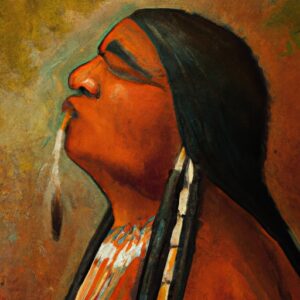Feast of Tradition: Celebrating with Traditional Apache Cuisine
Introduction – Feast of Tradition: Celebrating with Traditional Apache Cuisine
The Feast of Tradition celebrates the rich culinary heritage of the Apache people, whose wisdom and connection to nature have shaped their traditional cuisine. This article delves into the time-honored recipes and the cultural significance behind each dish, highlighting the deep-rooted respect for the land and its bounty. Feast of Tradition: Celebrating with Traditional Apache Cuisine in Apache culture
Apache cuisine is characterized by its use of native ingredients, many of which have been harvested and prepared in the same way for generations. From mesquite beans to acorn mush, each ingredient tells a story of survival, adaptation, and reverence for the natural world. Traditional cooking methods, such as roasting over an open fire, are not just techniques but an integral part of Apache identity and heritage. Feast of Tradition: Celebrating with Traditional Apache Cuisine in Apache culture
“Food is more than sustenance; it’s a connection to our ancestors and the earth,” says a respected Apache elder. This profound relationship with food is reflected in their seasonal and sustainable practices, ensuring that the natural world is preserved for future generations.
Feast of Tradition: Celebrating with Traditional Apache Cuisine in Apache culture
Join us as we explore traditional Apache recipes, each one a testament to a culture that values harmony with nature and the wisdom passed down through the ages. Whether it’s the simplicity of Apache bread or the intricate flavors of their stews, these dishes offer a taste of history and an understanding of the Apache way of life.
History
The traditional Apache cuisine has deep roots that trace back to the nomadic lifestyle of the Apache tribes. Their diet was heavily influenced by the environment, relying on the land’s natural resources. Hunting, gathering, and farming were essential components of their food culture.
As the Apache people moved across the Southwestern United States, they developed unique culinary practices. They utilized indigenous ingredients such as corn, beans, and squash, often referred to as the “Three Sisters.” Hunting provided meat, mainly from deer, rabbits, and turkey, which were prepared using age-old methods.
During communal gatherings and celebrations, food played a central role, embodying the essence of Apache traditions. Special dishes were prepared for ceremonies, using recipes passed down through generations. A popular saying among the Apache captures the importance of food in their culture:
“Food is our connection to the earth and our ancestors.”
Modern efforts to preserve and honor Apache culinary traditions have led to the revival of old recipes and cooking techniques. Community events, such as the ‘Feast of Tradition,’ celebrate these age-old practices, promoting cultural heritage and bonding. These feasts serve as a testament to the resilience and enduring spirit of the Apache people.
An Apache story – Feast of Tradition: Celebrating with Traditional Apache Cuisine
Feast of Tradition: Celebrating with Traditional Apache Cuisine – The Apache people have a rich tradition of storytelling that has been passed down through generations. One such story revolves around the significance of food in their culture. Traditional Apache cuisine is more than just a means of sustenance; it embodies their connection to the earth, their heritage, and their ancestors.
“Food is our medicine and our celebration, a gift from Mother Earth,” shared an elder.
This wisdom is evident in the thoughtful preparation and communal sharing of meals. Ingredients are sourced directly from the land, reflecting a deep respect for nature. Corn, beans, squash, and wild game are staples, each holding symbolic and nutritional importance.
Feasts are occasions to honor these traditions, bringing families and communities together. Elders teach the younger generations how to prepare dishes while sharing stories of the past. This blend of culinary art and storytelling fortifies the Apache identity.
Through these gatherings, values of gratitude, unity, and respect for the natural world are reinforced. The act of eating becomes a ritual that transcends mere physical nourishment. It is a time to reflect, give thanks, and celebrate the continuity of Apache cultural heritage.
Grandfather Silas sat by the flickering fire, his weathered face illuminated by the warm glow. “Gather ’round, children,” he beckoned, voice deep with years of wisdom. The young ones shuffled closer, eyes wide with anticipation.
“Long ago, during the time of the Harvest Moon,” he began, “our people would come together for the Feast of Tradition. It was a time of celebration, but also of remembering who we are.”
He paused, the crackling of the fire the only sound. “Our ancestors hunted the deer and gathered the mesquite beans. The women ground the corn into atole. The aroma of roasted meat and fresh bread filled the air. It was a feast for the soul, as much as for the body.”
Little Naiche, eyes gleaming, asked, “What did you love most, Grandfather?”
Silas’s eyes softened. “I loved seeing the whole community together, sharing stories and laughter. I remember my grandmother’s frybread. She would say, ‘This bread connects us to the Earth and to each other.'”
Feast of Tradition: Celebrating with Traditional Apache Cuisine – Silas picked up a piece of the frybread he had prepared earlier, the same recipe his grandmother used. “Taste this, and remember,” he said, passing it around.
The children’s eyes widened as they took a bite, the warm, savory flavor bringing smiles to their faces.
“The lesson,” Silas continued, “is that traditions like our feast keep our spirits strong. They remind us of our roots and our connection to the Earth and each other. When we honor our traditions, we honor ourselves.”
The children nodded, understanding lighting up their faces. As the fire crackled on, they knew they were not just eating a meal, but partaking in a piece of their history, their culture, and their identity.
Implementing it in your life
Integrating traditional Apache cuisine and wisdom into your life can foster a deep connection to nature and heritage. Begin by researching traditional recipes and understanding the cultural significance behind the ingredients. This will not only heighten your appreciation for the food but also link you to the rich history and traditions of the Apache people.
Incorporating these elements into your meals can be a gradual process. Start by including one traditional dish into your weekly meal plan and build from there. Embrace the cooking process as a mindful practice, reflecting on the ancestral wisdom that guides each recipe.
- Research and gather traditional Apache recipes from reliable sources.
- Source ingredients from local farmers’ markets or grow them in your garden.
- Dedicate time to cook traditional dishes at least once a week.
- Share these meals with family and friends to spread awareness and appreciation.
- Learn about the cultural significance of each ingredient and dish.
- Keep a journal to document your experiences and feelings throughout the process.
- Attend cultural events or workshops focused on traditional Apache cuisine.
By following these steps, you can cultivate a greater sense of intentional living and cultural respect. The process encourages mindfulness and a deeper appreciation for indigenous wisdom. As you continue to explore and implement these traditions, you will likely find a profound sense of connection and personal enrichment.
This journey can foster personal growth by enhancing your culinary skills and broadening your cultural horizons. Embracing traditional Apache cuisine as part of your life helps preserve important cultural heritage while providing a meaningful way to connect with history and community.
Conclusion
The ‘Feast of Tradition’ serves as a poignant reminder of the rich culinary heritage of the Apache people, providing both a cultural and sensory experience that bridges generations. Apache wisdom, deeply embedded in the preparation and sharing of traditional dishes, offers a unique perspective on community, resilience, and respect for nature’s bounty.
By delving into traditional Apache cuisine, we honor the history and values of a proud and enduring culture. Each meal is more than sustenance; it is a celebration of ancestral knowledge and a reaffirmation of identity. This wisdom, passed down through generations, nurtures not only the body but also the spirit.
“Eating together is a sign of unity; preparing food together is an act of love and respect.”
This Apache saying encapsulates the essence of communal meals, urging us to appreciate the deeper significance of our culinary choices and gatherings. Let us embrace these traditions, not just in celebration, but as a continuous practice to enrich our lives and communities.
Feast of Tradition: Celebrating with Traditional Apache Cuisine – Take the opportunity to explore and share traditional Apache recipes in your own culinary adventures. By doing so, you contribute to the preservation and appreciation of a vital cultural heritage. Join the journey of culinary discovery and solidarity, honoring the past while nourishing the present and future.
The image and article have been augmented with AI.
Further Resources:
- What is the significance of the bow and arrow in Apache spiritual symbolism?
- What is the significance of the warrior tradition in Apache spirituality?
- What is the importance of silence and solitude in Apache spiritual practices?
- How do Apache spiritual practices influence their concept of wisdom and knowledge?
- What is the importance of the concept of harmony in Apache spirituality?
- What is the role of music and dance in Apache spiritual ceremonies?
- What is the significance of the moon in Apache spiritual beliefs?
Thank you for reading!







